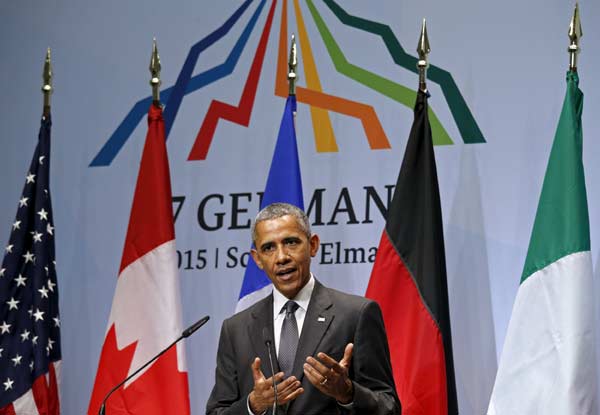G7 summit wraps up with pledge over climate, terrorism
(Xinhua) Updated: 2015-06-09 09:28
 |
|
US President Barack Obama speaks during his news conference at the conclusion of the G7 Summit in the Bavarian town of Kruen, Germany June 8, 2015. [Photo/Agencies] |
GARMISCH-PARTENKIRCHEN -- Leaders of the Group of Seven (G7) wrapped up their two-day summit on Monday with a pledge to take actions on issues ranging from climate change, world trade to the Ukraine conflict and the fight against terrorism.
Agreements achieved on the issue of climate change have drawn the most attention, with the G7 countries committing to fill a gap of financial support to developing countries for addressing climate change and declaring to seek global decarbonization within this century.
In a joint declaration issued after the summit which took place in the German town of Garmisch-Partenkirchen, the heads of state and government of Canada, France, German, Italy, Japan, Britain and the United States said they would seek a global decarbonization within this century and to reduce global carbon emissions by 40 to 70 percent by 2050 compared to 2010 levels, asking "all parties" to share the task.
For the G7 part, the leaders declared that their countries would strive for a transformation of their energy sectors by 2050 as well as develop long term national low-carbon strategies.
The group also reaffirmed commitment to continue its efforts to meet the target of providing $100 billion dollars a year by 2020 to developing countries to help them deal with climate change.
The fund, however, would not only come from public sector, the main source required by developing countries, but would also include private money.
Speaking of the conflict in Ukraine, another hot topic at this year's summit, the G7 expressed concerns over the recent increase in fighting in the country's eastern regions, and urged all sides to fully respect and implement the ceasefire and withdraw heavy weapons.
Leaders of the seven industrialized countries reiterated their full support for efforts to find a diplomatic solution to the conflict in Ukraine, renewing calls for a full implementation of the Minsk agreements signed in February 2015.
They called on the Ukrainian government to "decisively continue the necessary fundamental transformation in line with IMF and EU commitments," and promised further financial and technical support for Ukraine's reform efforts.






